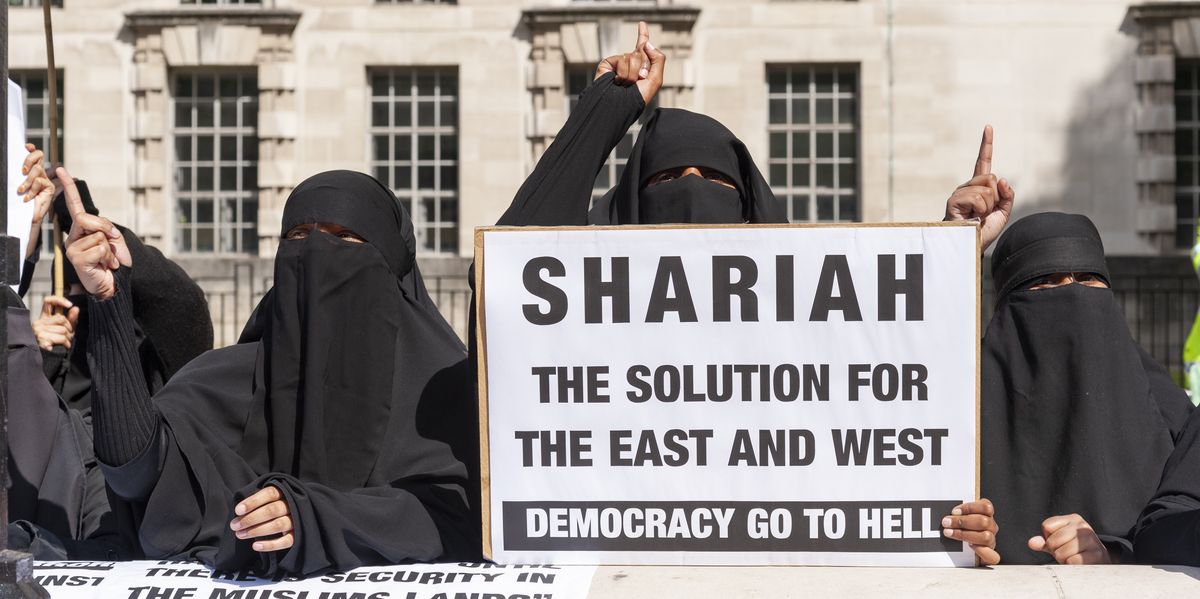They tried the same here in Ontario a few years back, but thanks to Tarek Fatah he was able to stop them.
Britain becomes 'western capital' for sharia law courts as 85 open throughout the UK
Britain has emerged as the "western capital" for sharia courts, with 85 Islamic councils now operating across the country since the first was established in 1982.
These religious bodies have become increasingly influential, drawing Muslims from across Europe and North America who seek religious rulings on marriage and family matters.
The councils, typically consisting of panels of Islamic scholars who are almost always male, serve as informal bodies issuing religious rulings particularly focused on marriages and divorces.
Sharia was defined in an official review by theologian Professor Mona Siddiqui as jurisprudence based on Islamic scholars' opinions from the time of Mohammed in the 7th century until the 13th century.
An estimated 100,000 Islamic marriages have been conducted in Britain, with many not officially registered with civil authorities.
These marriages often require religious rulings for dissolution, particularly affecting women who must seek approval from sharia councils for divorce.
Many aspects of traditional sharia have been modified in most Muslim countries, but classical rulings are frequently still observed in marriage and divorce matters.
The councils have religious authority to end marriages at a wife's request if her husband is unwilling to grant a divorce, though this process differs significantly from civil proceedings.
Men seeking Islamic divorces can end their marriages simply by saying "divorce" three times, highlighting a stark contrast in gender-based religious procedures.
The normalisation of polygamy is evident through modern technology, with an app allowing Muslim men in England and Wales to create Islamic wills.
The app features a drop-down menu enabling men to specify between one and four wives.
This same app demonstrates further gender disparities, allocating daughters half the inheritance amount given to sons.

 www.gbnews.com
www.gbnews.com
Britain becomes 'western capital' for sharia law courts as 85 open throughout the UK
Britain has emerged as the "western capital" for sharia courts, with 85 Islamic councils now operating across the country since the first was established in 1982.
These religious bodies have become increasingly influential, drawing Muslims from across Europe and North America who seek religious rulings on marriage and family matters.
The councils, typically consisting of panels of Islamic scholars who are almost always male, serve as informal bodies issuing religious rulings particularly focused on marriages and divorces.
Sharia was defined in an official review by theologian Professor Mona Siddiqui as jurisprudence based on Islamic scholars' opinions from the time of Mohammed in the 7th century until the 13th century.
An estimated 100,000 Islamic marriages have been conducted in Britain, with many not officially registered with civil authorities.
These marriages often require religious rulings for dissolution, particularly affecting women who must seek approval from sharia councils for divorce.
Many aspects of traditional sharia have been modified in most Muslim countries, but classical rulings are frequently still observed in marriage and divorce matters.
The councils have religious authority to end marriages at a wife's request if her husband is unwilling to grant a divorce, though this process differs significantly from civil proceedings.
Men seeking Islamic divorces can end their marriages simply by saying "divorce" three times, highlighting a stark contrast in gender-based religious procedures.
The normalisation of polygamy is evident through modern technology, with an app allowing Muslim men in England and Wales to create Islamic wills.
The app features a drop-down menu enabling men to specify between one and four wives.
This same app demonstrates further gender disparities, allocating daughters half the inheritance amount given to sons.

Britain becomes 'western capital' for sharia law courts as 85 open throughout the UK
The councils serve as informal bodies issuing religious rulings focused on marriages and divorces
 www.gbnews.com
www.gbnews.com







